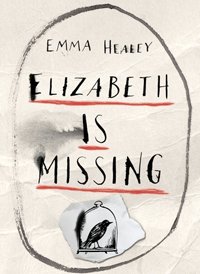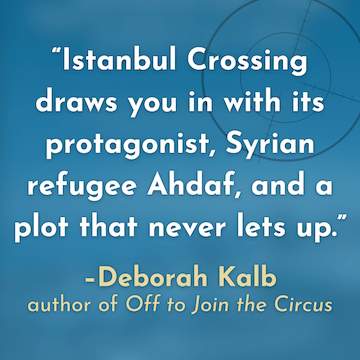 Emma Healey has restored old books and designed and made new books. She’s seen books being printed, sold them in bookshops and issued them in libraries, and even met her partner, Andy, in a Waterstones! Now, after five years of writing, Emma has produced a book of her own and Elizabeth is Missing – a story which has an elderly woman with dementia as its central character – has been winning plaudits far and wide. I caught up with her in the midst of an international promotional tour, as she made an appearance at Blackpool’s Wordpool Festival.
Emma Healey has restored old books and designed and made new books. She’s seen books being printed, sold them in bookshops and issued them in libraries, and even met her partner, Andy, in a Waterstones! Now, after five years of writing, Emma has produced a book of her own and Elizabeth is Missing – a story which has an elderly woman with dementia as its central character – has been winning plaudits far and wide. I caught up with her in the midst of an international promotional tour, as she made an appearance at Blackpool’s Wordpool Festival.
There has been a huge buzz around your debut novel. How do you feel about the reaction?
It’s been amazing. This story is something that has lived inside my head for so long and it’s strange to think of it having a life of its own out in the world. But, of course, it’s really wonderful too – it’s what you hope for as a writer and I’m so grateful to everyone for reading and responding to the novel. I thought I’d have a big struggle to get it published but I’m incredibly grateful that Elizabeth is Missing has been so well received. It is in 19 languages now, Hebrew is the latest, and the book is selling in Taiwan, Brazil and China!
What inspired you to write the book?
My grandmother suffers with dementia and was really the trigger for the book. One day when she was in the car with my dad she said her friend was missing. She wasn’t – she was actually staying with friends – so it was no mystery really, but it got me thinking about what would have happened if that friend really had been missing.
As my grandmother’s dementia got worse, I decided I wanted to explore how it felt from the inside – there were things going on inside her head that I couldn’t understand and she couldn’t articulate, what was she trying to tell me?
I really enjoyed getting into Maud’s head. I spent a lot of time researching dementia, read papers on the subject and also found a lot of dementia diaries on the internet which were a great help in getting an insight into the disease. I studied the history of the discovery of Alzheimer’s disease. Then I made lists of symptoms, experiences and questions and tried to keep them all in mind while I was writing each scene.
I was a 20 something woman living in London and didn’t want to write about a 20 something woman living in London! It’s an area well covered already and people would probably have thought it was about me. I decided that if I wrote about an 82-year-old dementia sufferer, then no one could mistake it as a memoir.
 Are you a fan of crime fiction?
Are you a fan of crime fiction?
I love The Mysteries of Udolpho by Ann Radcliffe, which has a sinister, supernatural edge that I enjoy. MC Beaton and Agatha Christie are others I’ve enjoyed, but I’m not comfortable with violence in crime novels. I’ve been surprised that Elizabeth is Missing has been so well received as a crime book. I love mystery stories and that is what I decided to write.
My story needed the structure of a crime novel, a way of pulling the reader through and keeping them engaged with the plot, making their journey worthwhile. It seems to have been the right approach as the reaction has been amazing! I’m so happy that Maud has been so well received.
How did you approach writing your debut novel?
The book took me about five years to write. I was working full time for a lot of that, so there was lots of writing in my lunch break, at night, at weekends and even while commuting on the tube. I’m a planner, and had colour coded files where I used different fonts for past and future. I even drew up plans for the houses in the book. I initially wrote 15,000 words and the epilogue, then tended to jump around inside the story so it was important for me to keep track. I’m not disciplined though – there were times when Andy would virtually lock me in a room, tell me to get writing and promise to come back in an hour with a cup of tea!
When you are in the midst of writing a book I think it is important to touch base every day. If I wasn’t writing something, I would be reading back what I’d already written. I did take a month off writing at one point and found it really difficult to get back into the world I’d created.
The TV rights were sold before Elizabeth is Missing was even out. Will you have any input into a TV adaptation?
No, I’m not a screenwriter and I think that is quite a particular skill. I’d be very interested to see what a screenwriter does with the book, but I wouldn’t want to interfere in something that’s not my field. I’ve had a meeting with the team though I will not be involved in the script. All I’ve asked is that they don’t make Douglas too creepy. Of course, the TV version may never happen, but if it does I’ll be excited to watch it.
What’s next for you?
I’m currently touring to promote Elizabeth is Missing– today is my 71st signing – but I’m already thinking about my next book. I’m fascinated by the concept of collective memory and I also think I’ll be further exploring the mother daughter relationship. I also love trains and think there may be a rail journey in there too.
It all sounds a bit confused and all of those things could change when I actually get the time to sit down and write, which won’t be until August, September time. But I’m excited at the thought of it, which is a good sign.
Read our review of Elizabeth is Missing here.









